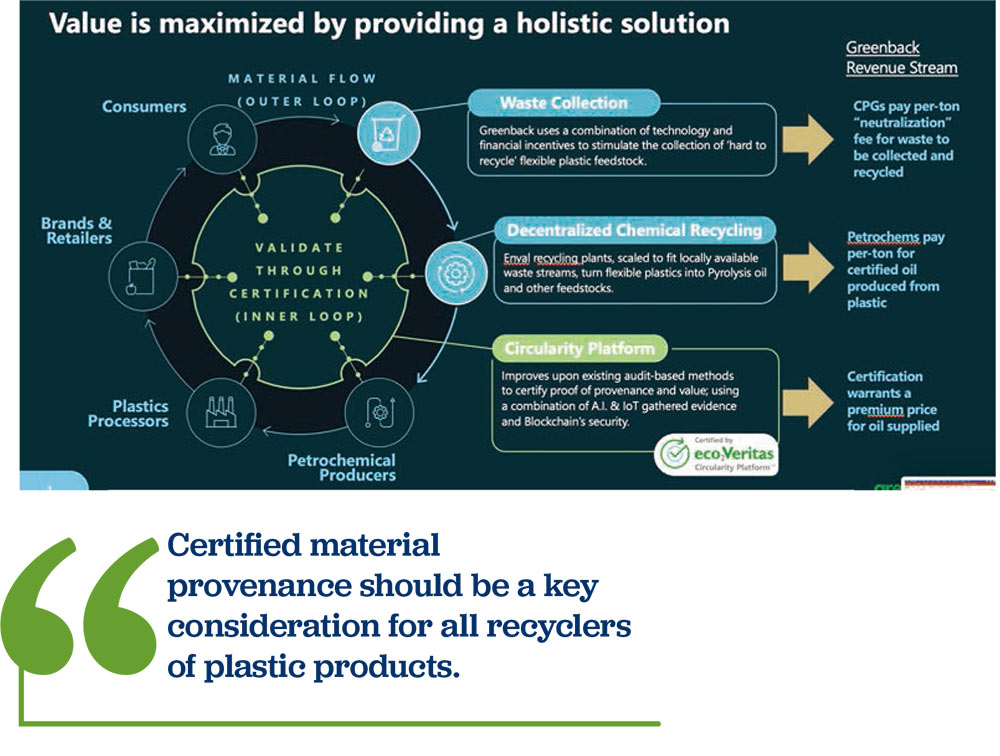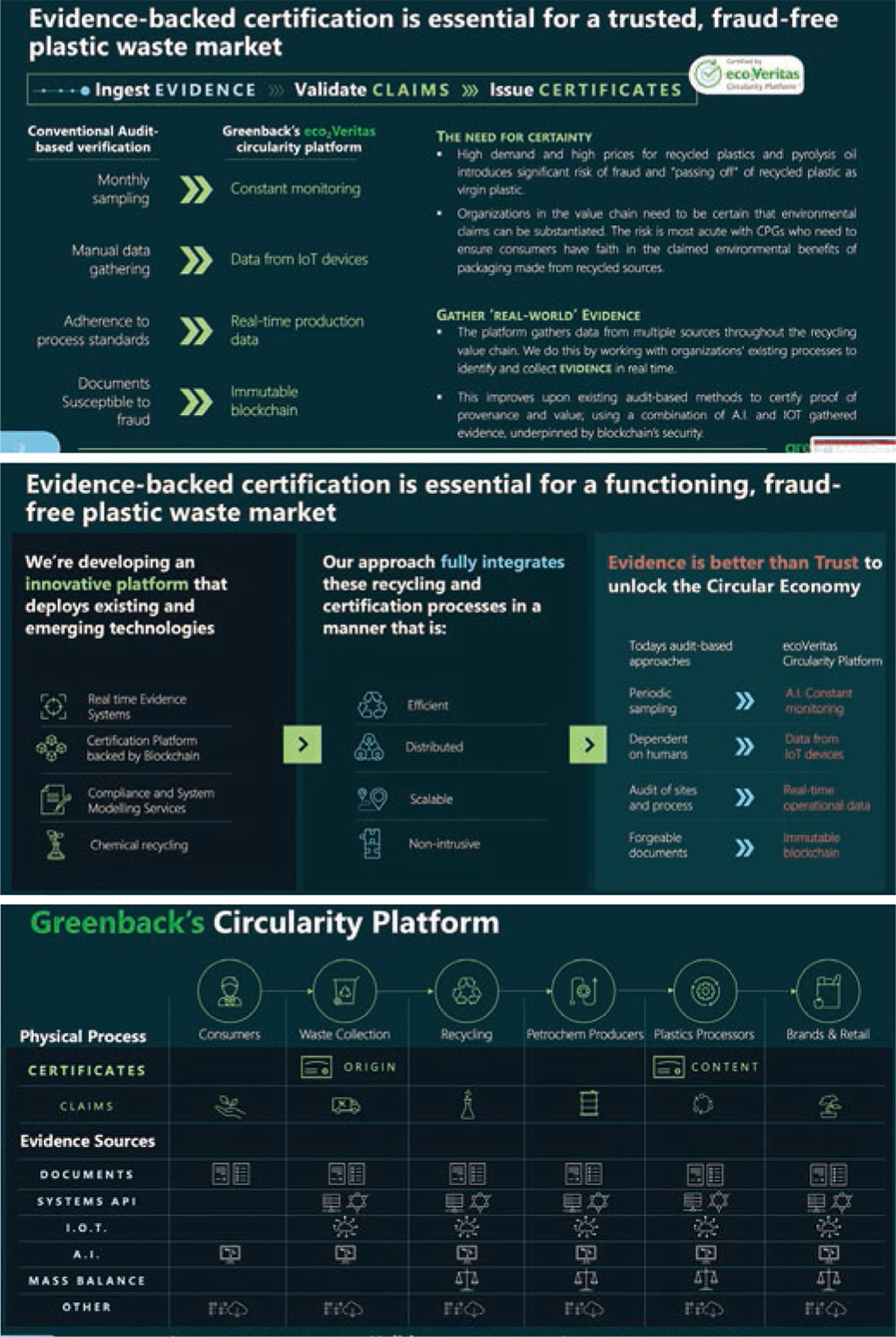Industry News
- Home
- Industry News
source: SustainablePlastics.com
When taking a global view of the recycling industry, it is becoming very apparent that there is an urgent need to reform current systems for recycling plastics in order to confront the plastic waste epidemic head-on.
When taking a global view of the recycling industry, it is becoming very apparent that there is an urgent need to reform current systems for recycling plastics in order to confront the plastic waste epidemic head-on. For this to happen, the industry needs to implement a holistic approach, moving away from individual point technologies that work in isolation, instead focusing on methods that can work in synergy even when using different technologies. The end goal remains to transform the entire plastic recycling system for a greener future, and one of the critical ways that this can be done is to ensure material provenance and certification.
Greenback Recycling Technologies(‘Greenback’), a plastic recycling and certification company, has embraced this concept and developed the eco2Veritas Circularity Platform™,which improves upon current audit-based systems when certifying proof of material provenance and value. This unique platform incorporates artificial intelligence and IoT gathered evidence, which is backed up on a private blockchain to provide additional security. The evidence is gathered through camera images, weigh scale data, and advanced analysis of waste types, including AI recognition and then stored digitally within a private blockchain. This process enables the end-user in real-time to digitally view the operation of plastic waste being transformed into a new feedstock for incorporation into new plastic materials and products.
The eco2veritas Circularity Platform is an agnostic system and can be implemented across different chemical recycling systems. It is also built into the company's circular economy process for plastic packaging. The technology addresses the needs of consumer-packaged goods companies(CPGs) by providing a reliable, certified source of post-consumer recyclate from existing waste streams. The advanced recycling technology adopted by Greenback turns multilayer flexible plastic packaging, with currently no recycled commercial value, into Py-oil via a pyrolysis process, providing CPGs with the recycled feedstock they need for new packaging production.

Post-consumer waste recyclate needs to come with full transparency of the supply chain right back to when the waste was collected, to avoid industrial fraud as recycled material prices climb globally as demand outstrips supply. At Greenback, Germanybased ARXUM provides the blockchain infrastructure that ensures that manufacturers have complete peace of mind when sourcing a sustainable, and certified recyclate. It makes use of EOSIO, an open-source platform for blockchain innovation and performance that creates secure, transparent, private blockchain networks for businesses. In this highly competitive environment, it is critical to substantiate all environmental claims. This is especially pertinent for those organizations that must reassure legislators and customers that the recyclate used in new plastic products has the required amount of recycled plastic as required by law or by product specification. Extended producer responsibility (EPR) and relevant plastic taxes that are currently in place, or being slated for implementation, will need to be adhered to; one reason why certified material provenance should be a key consideration for all recyclers of plastic products.
Greenback's sustainable distributed recycling management uses EOSIO to combat fraud because the company can offer a verifiable system to trace the origin of the plastic packaging along with processed materials. The digital system, developed in collaboration with Greenback, will be situated at every one of the Greenback recycling plants, located adjacent to landfill sites, so that it will be able to secure a cryptographic record of all the plastic collected. Each batch of plastic is digitally tracked via blockchain. At the same time, the system develops a smart contract that keeps track of each batch, so the end-user knows precisely where the recyclate has emanated from. By recirculating flexible plastic packaging waste into the industrial cycle and elevating this discarded material into a valuable commodity, Greenback is also helping to reduce CO2 and fossil oil depletion.

UK-based chemical recycling company Enval is also partnering with Greenback to provide microwave-induced pyrolysis technology to create sustainable and economical alternatives to flexible plastic waste landfills. Enval’s concept works in the following way: it processes mixed flexible packaging into Py-oil as a sustainable feedstock for new food-grade plastic products, directly substituting naphtha as a fossil fuel. The process is clean, efficient and economical for post-consumer and industrial waste. The plastic component of the waste degrades to form a mixture of hydrocarbons, and this mixture is then cooled down and separated into gas and oil. Notably, the gas can be used to generate the electricity required to power the process, thereby creating a closed-loop solution, while the new condensed oils are sold as a feedstock for CPG companies. Enval’s microwave pyrolysis plant processes organic material, such as paper or plastic, which is heated and broken down without oxygen. Microwaves provide heat energy, and the process can be configured to operate under mild mechanical conditions to extract fragile materials without damaging them. The technology is powered by electricity, eliminating the need for a chimney stack. This in turn enables renewable energy sources to create a highly sustainable recycling process.
In the Enval recycling process, shredded plastic aluminium laminates are mixed with carbon. When the carbon is exposed to the microwaves, it reaches up to 600°C in just a few minutes. This heat energy is then quickly and efficiently transferred to the plastic waste via conduction. Another advantage of this system is that fragile aluminium foil within the flexible and hard-to-recycle plastic remains undamaged during the process and can be recovered in solid form, clean and ready for reprocessing as a single aluminium stream with high intrinsic value. Recycling aluminium through the Enval process leads to up to 75% energy savings. With a purity exceeding 98% and a minimum metal yield of 80%, it can be directly reintroduced to the metal re-smelting process. A typical Enval plant produces 200 to 400 tonnes of aluminium a year, depending on the feedstock supplied.
The pyrolysis plants are scalable and quick to commission due to their small scale. A single module can process 2.5kt per annum of hard-to-recycle plastic waste and can neatly scale in 2.5 KTA increments to fit the size of the local waste stream available. The operational model can be established in developing or developed regions and measured according to UN Sustainable Development Goals and in line with Environmental, Social & Governance (ESG) impacts. As such, Greenback’s first significant project adopting this philosophy will be based in Mexico. Working with Nestlѐ, the company will establish an advanced chemical recycling plant at a landfill site in the country which will provide a framework for further projects worldwide. Focusing on the digital aspect in collaboration with the physical process of recycling hard-to-recycle plastics has the potential to unlock high-performance materials that are currently lost to landfills. In the future, this will enable the recycling of valuable resources and pave the way for responsible packaging solutions, changing the perception of plastic and driving a circular economy. Consumers want to know more about the packaging, and they are looking for brands that are sustainable and have an environmental responsibility extending beyond how a product is made. CPGs can now demonstrate sustainability to consumers and address the issue of plastic waste effectively through securing legitimate sources of clean, recycled plastics. Through the use of this innovative technology, Greenback is solving a complex global problem by creating an ethical, predictable, and liquid market for certified post-consumer recycled plastic that’s safe for use in new food-grade packaging. Philippe von Stauffenberg is the founder and CEO of Greenback Recycling Technologies, a UK-headquartered company of over 40 people on a mission to solve the global plastic waste crisis. Greenback is implementing a scalable and distributed advanced collection and recycling solution, that offers brand owners and the plastics value chain fully traceable recyclate. The company is building a decentralized network of collection and recycling plants near the sources of post-consumer plastic waste around the world. The company’s certification technology uses blockchain- based evidence to trace and authenticate the provenance and composition of materials. This enables waste plastic to be used as a feedstock for food-grade commercial packaging applications at predictable prices and in dependable quantities.